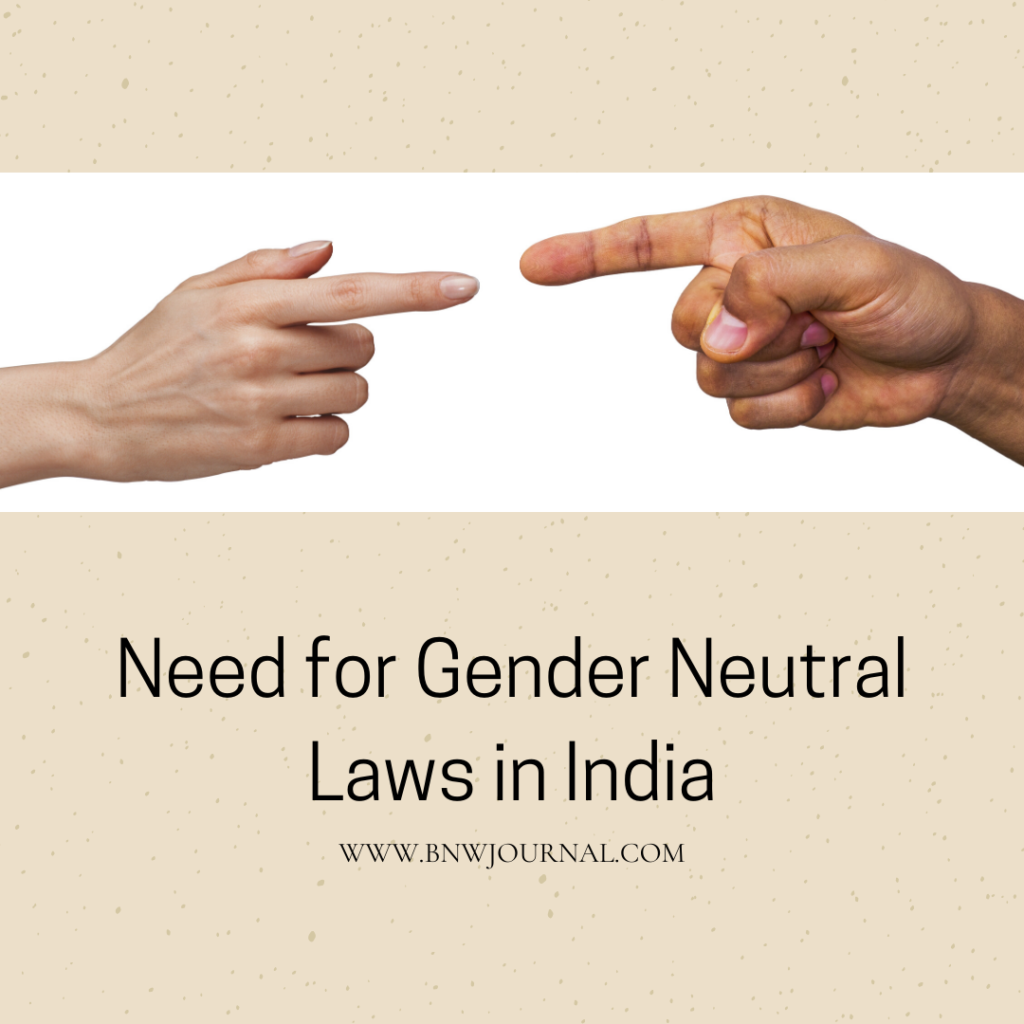![]()
INTRODUCTION
There is a need for Gender Neutral Laws in India. Male and females should be the same with equal rights and equal duties. From home to school to the workplace, everyone should be treated equally irrespective of their sex. Due to gender bias in the corporate world, there have been circumstances where female employees earn less than men employees who are similarly qualified. The main objective of gender neutrality is to create a society in which women and men enjoy the same opportunities. Irrespective of gender there must be equal rights and obligations in all spheres of life. Gender neutrality is closely linked to sustainable development, educational attainment, and political empowerment.

PROVISIONS FOR GENDER NEUTRALITY
- Article 14 – Article 14 uses two expressions, “equality before the law” and “equal protection of the laws”.
- Article 15 – Prohibition of discrimination on grounds of religion, race, caste, sex or place of birth. Discrimination on the ground of sex is prohibit under Article 15(1). But under Article 15(3) the state is allow to make special provisions for women and children.
- Article 16 – Equality of opportunity in matters of public employment. Article 16(1) gives in general terms, the right to equality of opportunity, Article 16(2) deals with the discrimination against the citizen on grounds of religion, race, caste, sex, descent, place of birth and residence.
- Article 39-A Equal justice and free legal aid
- Article 42 – Provision for just and humane conditions of work and maternity relief. Article 42 lays down that state shall make provision for securing just and humane conditions of work and maternity relief.
- Article 46 – Promotion of education and economic interests of Scheduled Castes, Scheduled Tribes, and other weaker sections.
- Article 47 – Duty of the state to raise the level of nutrition and the standard of living and to improve the public health
- Article 51-A – Fundamental duties
- Article 238-D – Reservation of seats in panchayat
- Article 243-T – Reservation of seats
Article 243-T states:
(3) not less than one-third (including the no. of seats reserve for women belonging to the Scheduled Castes and the Scheduled Tribes) of the total no. of seats to be fill by direct election in every municipality shall be reserve for women and such seats may be allot by rotation to different constituencies in a municipality.
(4) the offices of chairpersons in the municipalities shall be reserve for the Scheduled Castes and the Scheduled Tribes and women in such manner as the legislature of a State may, by law, provide.
LEGAL PROVISIONS
The crimes identified under Indian Penal Code:
- Rape (Sec. 376 IPC) – Only a man who can be liable for rape i.e. a woman cannot be guilty of rape unlike English law where the woman is equally liable for rape as in case of a man. However, a woman can be liable for abetment of rape under section 109, IPC.
- Kidnapping and Abduction for different purposes (Sec. 363-373) – Section 366 defines kidnapping, abducting or inducing woman to compel her marriage, etc. Section 366B deals with the importation of girls from foreign countries. Section 372 deals with Selling minor for purposes of prostitution, etc. Finally, Section 373 deals with buying minor for purposes of prostitution, etc.
- Homicide for Dowry, Dowry Deaths, or their attempts (Section 302/304-B IPC) – There four sections when a married woman is subjected to cruelty and harassment leading an offense are section 498, IPC, section 304, IPC, section 302, IPC and Section 306, IPC.
- Torture, both mental and physical (Section 498-A IPC)
- Molestation (Section 354 IPC)
- Sexual Harassment (Section 509 IPC)
The crimes identified under the Special Laws:
- The Protection of Women from Domestic Violence Act, 2005
- The Dowry (Prohibition) Act, 1961
- The Commission of Sati (Prevention) Act, 1987
- The Immoral Traffic (Prevention) Act, 1956
- The Child Marriage Restraint (Amendment) Act, 1979
CONCLUSION
In India, women are always at an advantage because of our recent laws which provide them so much freedom. But the question arises here is are women using the laws meant for their protection in the right way or misusing them against men. Also are women able to enjoy her rights? Or if men are overpowering her thus making her unaware of her rights? There have been instances where innocent men and families have been victimized just because some women misuse the laws.
There must be gender-neutral laws for the betterment of the society and to point out the equality between both genders. It must not be men and women but victims and culprits irrespective of gender. No one must misuse the freedom given to them nor must they be prevented from knowing their rights.



0 Comments